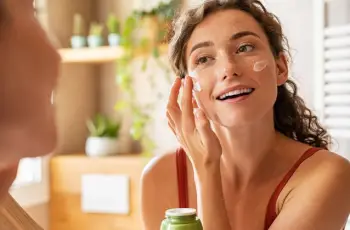
Mitochondria Function in Skin
Understanding the role of mitochondria in skin health is crucial for anyone passionate about skincare. These tiny organelles, often referred to as the “powerhouses of the cell,” are pivotal in maintaining the skin’s vitality, resilience, and youthful appearance. In this article, I will discuss why- as a dermatologist- I am fascinated with the mitochondria. I’ll cover the function of mitochondria, their importance in skin health, and how specific skincare ingredients can protect and enhance mitochondrial function. I’ll also explore how energy production in cells affects the skin and provide guidance on building a personalized skincare routine to combat mitochondrial aging and damage.
Mitochondria are essential for energy production, cell renewal, and preventing aging.
Antioxidants protect mitochondrial function
Skin care ingredients can boost cellular energy production
Skin care products that protect mitochondria and boost cell energy can be added to your skin care rotuine
Cellular Energy, Mitochondria and Skin Aging
In the skin care industry, you will hear claims that niacinamide, Co Q1 and Nicotinamide Adenine Dinucleotide (NAD+) giv skin energy. But- wat does this mean? Is it important to use these ingredient sin your skin care routine? Learn why or why not below.
Knowing which of the 16 Baumann Skin Types you are will help you answer the question of whether or not your skin needs energy boosting ingredients. Once you know our skin type, you can shop by your skin type and build personalized skin care regimens that will target your skin’s specific issues.
What Are Mitochondria?
Mitochondria are small, double-membrane-bound organelles found in all human cells. They are responsible for producing energy through a process called cellular respiration. This energy is stored in the form of adenosine triphosphate (ATP), which cells use to perform various functions. Mitochondria also play roles in regulating cellular metabolism, signaling, and apoptosis (programmed cell death).
What Do Mitochondria Do for the Skin?
Mitochondria are essential for skin health because they provide the energy required for everything the cell needs to do to stay young such as:
Make collagen
Make glycosaminoglycans like hyaluronic acid
Make elastin
Cell renewal
DNA repair.
Skin cells are constantly regenerating, and this process demands a significant amount of energy. Mitochondria supply this energy as ATP, enabling skin cells to divide, repair damage, and maintain a healthy barrier against environmental stressors.
Why Are Mitochondria Important in Skin?
Healthy mitochondria are crucial for preventing premature skin aging. They help combat oxidative stress, which occurs when there is an imbalance between free radicals and antioxidants in the body.
Mitochondria also play a role in autophagy, a process where damaged cell components or senescent cells are removed,
Energy and Mitochondria
The primary function of mitochondria is to produce ATP through cellular respiration, which involves several steps:
glycolysis
the citric acid cycle (Krebs cycle)
oxidative phosphorylation.
These processes convert nutrients into energy, which cells use for various activities.
How Do Cells Get Energy?
Cells obtain energy from the food we eat. During digestion, carbohydrates, fats, and proteins are broken down into smaller molecules like glucose. These molecules enter cells and undergo glycolysis, producing a small amount of ATP. The process continues in the mitochondria, where the citric acid cycle and oxidative phosphorylation generate the majority of the cell’s ATP. Below I discuss cosmetic ingredients and supplements that can help increase energy production in cells.
Why Do Cells Need Energy?
Cells need energy for almost every function they perform. In the skin, energy is required to do things like:
Make new skin cells
Make lipids for the skin barrier
Make natural moisturizing factor from filaggrin
Restore collagen
Make elastin
Make the components of the extracellular matrix (ECM)
DNA repair
Digestion of cell “garbage”
Wound repair
Maintain the immune system
Without sufficient energy, these processes slow down, leading to signs of aging such as wrinkles, sagging, and dullness.
What Is ATP?
Adenosine triphosphate (ATP) is a molecule that carries energy within cells. It is often referred to as the “energy currency” of the cell. ATP powers many cellular processes, including muscle contraction, nerve impulse propagation, movement of immune cells, production of cellular components, and other processes needed to combat aging. In the skin, ATP is essential for maintaining healthy cell function and repair and keep skin looking young.
Skin Care Ingredients and Mitochondria
Certain skincare ingredients can protect and enhance mitochondrial function, thereby promoting healthier, more youthful skin. Below is a list of ingredients in skin care products that play a role in mitochondrial function in the skin.
Ingredients That Protect Mitochondria
Antioxidants: Vitamin C and Vitamin E are examples of powerful antioxidants that protect mitochondria from oxidative damage by neutralizing free radicals. You can find a list of antioxidants used in skin care at this link.
Coenzyme Q10: This antioxidant supports mitochondrial energy production and reduces oxidative stress.
Resveratrol: Found in red wine and grapes, resveratrol enhances mitochondrial function and provides protection against UV-induced damage.
Omega-3 Fatty Acids: These essential fats, found in fish oil and flaxseed, help maintain mitochondrial integrity and reduce inflammation.
Ingredients That Increase Cellular Energy
Antiwrinkle serums and antiaging creams often contain ingredients that help increase cellular energy.
Here are examples of these ingredients:
Niacinamide (Vitamin B3): Enhances the production of ATP, improving cellular energy and overall skin health.
Pyrroloquinoline Quinone (PQQ): A potent antioxidant that stimulates the production of new mitochondria, enhancing cellular energy production.
Coenzyme Q10 (Ubiquinone): Vital for ATP production and protecting cells from oxidative damage.
Nicotinamide Adenine Dinucleotide (NAD+): Essential for cellular energy production and repair processes, NAD+ levels decline with age, and supplementing can boost mitochondrial function.
Skin Care Products to Strengthen Mitochondria
Selecting skincare products that contain ingredients to help maintain mitochondrial health and promote youthful skin can be hard to do. I can help! Your best bet is to take our skin type quiz and shop using your skin type, but I feature some mitochondria friendly skin care products below.
Mitochondria Friendly Skin Care Routine
The Baumann Skin Types that need ingredients that preserve mitochondria and give them energy are the wrinkle-prone skin types. Understanding your Baumann Skin Type® is essential for creating an effective skincare routine that addresses your specific needs. Taking the skin type quiz will identify your skin type and help you select the most appropriate products.
Mitochondria play a crucial role in maintaining skin health and preventing signs of aging. By understanding how these organelles function and incorporating skincare ingredients that support mitochondrial health, you can enhance your skin’s vitality and appearance. Taking the Baumann Skin Type quiz is a valuable step in building a personalized skincare routine tailored to your specific needs.


